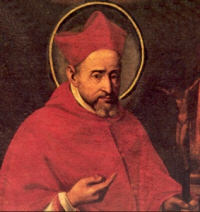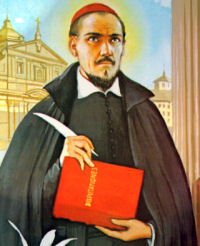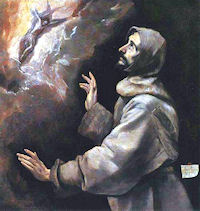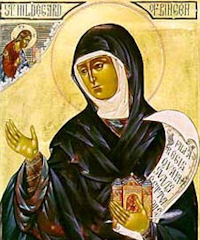Saint Hildegard of Bingen
Doctor of the Church
September 17th

Illumination from the Liber Scivias showing Hildegard receiving a vision, inscribing what she sees on a wax tablet, and dictating to her scribe and secretary
O God, by whose grace thy servant Hildegard, enkindled with the fire of thy love, became a burning and shining light in thy Church: Grant that we also may be aflame with the spirit of love and discipline, and may ever walk before thee as children of light; through Jesus Christ our Lord, who with thee, in the unity of the Holy Spirit, liveth and reigneth, one God, now and for ever. AMEN+
***
Saint Hildegard of Bingen (1098-1179)
Proclaimed a Doctor of the Church by Pope Benedict XVI on October 7, 2012
Pope Benedict XVI devoted two of his Wednesday audiences on Saint Hildegard in September 2012, which give her personal history and her unique accomplishments that have especial significance in our time. The pope’s two-part commentary on Saint Hildegard follows.
Papal Summer Residence, Castel Gandolfo
Wednesday, 1st September 2010
Saint Hildegard of Bingen
Dear Brothers and Sisters,
In 1988, on the occasion of the Marian Year, Venerable John Paul II wrote an Apostolic Letter entitled Mulieris Dignitatem on the precious role that women have played and play in the life of the Church. "The Church", one reads in it, "gives thanks for all the manifestations of the feminine "genius' which have appeared in the course of history, in the midst of all peoples and nations; she gives thanks for all the charisms that the Holy Spirit distributes to women in the history of the People of God, for all the victories which she owes to their faith, hope and charity: she gives thanks for all the fruits of feminine holiness" (n. 31).
Various female figures stand out for the holiness of their lives and the wealth of their teaching even in those centuries of history that we usually call the Middle Ages. Today I would like to begin to present one of them to you: Saint Hildegard of Bingen, who lived in Germany in the 12th century. She was born in 1098, probably at Bermersheim, Rhineland, not far from Alzey, and died in 1179 at the age of 81, in spite of having always been in poor health.
Hildegard belonged to a large noble family and her parents dedicated her to God from birth for his service. At the age of eight she was offered for the religious state (in accordance with the Rule of St Benedict, chapter 59), and, to ensure that she received an appropriate human and Christian formation, she was entrusted to the care of the consecrated widow Uda of Gölklheim and then to Jutta of Spanheim who had taken the veil at the Benedictine Monastery of St Disibodenberg. A small cloistered women's monastery was developing there that followed the Rule of St Benedict. Hildegard was clothed by Bishop Otto of Bamberg and in 1136, upon the death of Mother Jutta who had become the community magistra (Prioress), the sisters chose Hildegard to succeed her. She fulfilled this office making the most of her gifts as a woman of culture and of lofty spirituality, capable of dealing competently with the organizational aspects of cloistered life.
A few years later, partly because of the increasing number of young women who were knocking at the monastery door, Hildegard broke away from the dominating male monastery of St Disibodenburg with her community, taking it to Bingen, calling it after Saint Rupert and here she spent the rest of her days. Her manner of exercising the ministry of authority is an example for every religious community: she inspired holy emulation in the practice of good to such an extent that, as time was to tell, both the mother and her daughters competed in mutual esteem and in serving each other.
During the years when she was superior of the Monastery of Saint Disibodenberg, Hildegard began to dictate the mystical visions that she had been receiving for some time to the monk Volmar, her spiritual director, and to Richardis di Strade, her secretary, a sister of whom she was very fond. As always happens in the life of true mystics, Hildegard too wanted to put herself under the authority of wise people to discern the origin of her visions, fearing that they were the product of illusions and did not come from God. She thus turned to a person who was most highly esteemed in the Church in those times: St Bernard of Clairvaux, of whom I have already spoken in several Catecheses. He calmed and encouraged Hildegard.
However, in 1147 she received a further, very important approval. Pope Eugene III, who was presiding at a Synod in Trier, read a text dictated by Hildegard presented to him by Archbishop Henry of Mainz. The Pope authorized the mystic to write down her visions and to speak in public. From that moment Hildegard's spiritual prestige continued to grow so that her contemporaries called her the "Teutonic prophetess". This, dear friends, is the seal of an authentic experience of the Holy Spirit, the source of every charism: the person endowed with supernatural gifts never boasts of them, never flaunts them and, above all, shows complete obedience to the ecclesial authority. Every gift bestowed by the Holy Spirit, is in fact intended for the edification of the Church and the Church, through her Pastors, recognizes its authenticity.
I shall speak again next Wednesday about this great woman, this "prophetess" who also speaks with great timeliness to us today, with her courageous ability to discern the signs of the times, her love for creation, her medicine, her poetry, her music, which today has been reconstructed, her love for Christ and for his Church which was suffering in that period too, wounded also in that time by the sins of both priests and lay people, and far better loved as the Body of Christ. Thus St Hildegard speaks to us; we shall speak of her again next Wednesday. Thank you for your attention.
***
Paul VI Hall
Wednesday, 8 September 2010
Saint Hildegard of Bingen (Part 2)
Dear Brothers and Sisters,
Today I would like to take up and continue my Reflection on Saint Hildegard of Bingen, an important female figure of the Middle Ages who was distinguished for her spiritual wisdom and the holiness of her life. Hildegard's mystical visions resemble those of the Old Testament prophets: expressing herself in the cultural and religious categories of her time, she interpreted the Sacred Scriptures in the light of God, applying them to the various circumstances of life. Thus all those who heard her felt the need to live a consistent and committed Christian lifestyle.
In a letter to St Bernard the mystic from the Rhineland confesses: "The vision fascinates my whole being: I do not see with the eyes of the body but it appears to me in the spirit of the mysteries.... I recognize the deep meaning of what is expounded on in the Psalter, in the Gospels and in other books, which have been shown to me in the vision. This vision burns like a flame in my breast and in my soul and teaches me to understand the text profoundly" (Epistolarium pars prima I-XC: CCCM 91).
Hildegard's mystical visions have a rich theological content. They refer to the principal events of salvation history, and use a language for the most part poetic and symbolic. For example, in her best known work entitled Scivias, that is, "You know the ways" she sums up in 35 visions the events of the history of salvation from the creation of the world to the end of time. With the characteristic traits of feminine sensitivity, Hildegard develops at the very heart of her work the theme of the mysterious marriage between God and humanity that is brought about in the Incarnation. On the tree of the Cross take place the nuptials of the Son of God with the Church, his Bride, filled with grace and the ability to give new children to God, in the love of the Holy Spirit (cf. Visio tertia: PL 197, 453c).
From these brief references we already see that theology too can receive a special contribution from women because they are able to talk about God and the mysteries of faith using their own particular intelligence and sensitivity. I therefore encourage all those who carry out this service to do it with a profound ecclesial spirit, nourishing their own reflection with prayer and looking to the great riches, not yet fully explored, of the medieval mystic tradition, especially that represented by luminous models such as Hildegard of Bingen.
The Rhenish mystic is also the author of other writings, two of which are particularly important since, like Scivias, they record her mystical visions: they are the Liber vitae meritorum (Book of the merits of life) and the Liber divinorum operum (Book of the divine works), also called De operatione Dei. In the former she describes a unique and powerful vision of God who gives life to the cosmos with his power and his light. Hildegard stresses the deep relationship that exists between man and God and reminds us that the whole creation, of which man is the summit, receives life from the Trinity. The work is centered on the relationship between virtue and vice, which is why human beings must face the daily challenge of vice that distances them on their way towards God and of virtue that benefits them. The invitation is to distance themselves from evil in order to glorify God and, after a virtuous existence, enter the life that consists "wholly of joy".
In her second work that many consider her masterpiece she once again describes creation in its relationship with God and the centrality of the human being, expressing a strong Christo-centrism with a biblical-Patristic flavor. The Saint, who presents five visions inspired by the Prologue of the Gospel according to Saint John, cites the words of the Son to the Father: "The whole task that you wanted and entrusted to me I have carried out successfully, and so here I am in you and you in me and we are one" (Pars III, Visio X: PL 197, 1025a).
Finally, in other writings Hildegard manifests the versatility of interests and cultural vivacity of the female monasteries of the Middle Ages, in a manner contrary to the prejudices which still weighed on that period. Hildegard took an interest in medicine and in the natural sciences as well as in music, since she was endowed with artistic talent. Thus she composed hymns, antiphons and songs, gathered under the title: Symphonia Harmoniae Caelestium Revelationum (Symphony of the Harmony of Heavenly Revelations), that were performed joyously in her monasteries, spreading an atmosphere of tranquillity and that have also come down to us. For her, the entire creation is a symphony of the Holy Spirit who is in himself joy and jubilation.
The popularity that surrounded Hildegard impelled many people to seek her advice. It is for this reason that we have so many of her letters at our disposal. Many male and female monastic communities turned to her, as well as Bishops and Abbots. And many of her answers still apply for us. For instance, Hildegard wrote these words to a community of women religious: "The spiritual life must be tended with great dedication. At first the effort is burdensome because it demands the renunciation of caprices of the pleasures of the flesh and of other such things. But if she lets herself be enthralled by holiness a holy soul will find even contempt for the world sweet and lovable. All that is needed is to take care that the soul does not shrivel" (E. Gronau, Hildegard. Vita di una donna profetica alle origini dell'età moderna, Milan 1996, p. 402).
And when the Emperor Frederic Barbarossa caused a schism in the Church by supporting at least three anti-popes against Alexander III, the legitimate Pope, Hildegard did not hesitate, inspired by her visions, to remind him that even he, the Emperor, was subject to God's judgment. With fearlessness, a feature of every prophet, she wrote to the Emperor these words as spoken by God: "You will be sorry for this wicked conduct of the godless who despise me! Listen, O King, if you wish to live! Otherwise my sword will pierce you!" (ibid., p. 412).
With the spiritual authority with which she was endowed, in the last years of her life Hildegard set out on journeys, despite her advanced age and the uncomfortable conditions of travel, in order to speak to the people of God. They all listened willingly, even when she spoke severely: they considered her a messenger sent by God. She called above all the monastic communities and the clergy to a life in conformity with their vocation. In a special way Hildegard countered the movement of German cátari (Cathars). The cátari (means literally "pure") advocated a radical reform of the Church, especially to combat the abuses of the clergy. She harshly reprimanded them for seeking to subvert the very nature of the Church, reminding them that a true renewal of the ecclesial community is obtained with a sincere spirit of repentance and a demanding process of conversion, rather than with a change of structures.
This is a message that we should never forget. Let us always invoke the Holy Spirit, so that he may inspire in the Church holy and courageous women, like Saint Hildegard of Bingen, who, developing the gifts they have received from God, make their own special and valuable contribution to the spiritual development of our communities and of the Church in our time.
***
Related page: Hildegard of Bingen: Voice of Living Light -- Mysterious, talented, colorful, and enigmatic woman, saint, and mystic. And doctor? -- by Sandra Miesel



 He was born at Montepulciano in Tuscany on October 4, 1542, the feast of the Poverello of Assisi toward whom he always cherished a special devotion. The day on which he died, September 17, is now the feast in honor of the stigmata of St. Francis.
He was born at Montepulciano in Tuscany on October 4, 1542, the feast of the Poverello of Assisi toward whom he always cherished a special devotion. The day on which he died, September 17, is now the feast in honor of the stigmata of St. Francis.  Saint Bonaventure, biographer of Saint Francis of Assisi, wrote that two years before his holy death he had been praying on Mount Alverno in a solitary retreat, where he had gone to fast for forty days in honor of the Archangel Michael. No one ever meditated more than Francis on the Passion of his Lord. During his retreat he beheld in vision a six-winged Seraph attached to a cross, and received at the same time a painful wound of the heart, which seemed to transpierce it. When the vision ended his own hands and feet bore the marks of the angelic crucifixion which he had seen in the vision. He understood by his vision that the soul must come to resemble Christ by the ardors of its interior fire, rather than by any physical, exterior means. We reproduce here a meditation of the saintly 19th century Abbot, Dom Guéranger of Solemnes in France
Saint Bonaventure, biographer of Saint Francis of Assisi, wrote that two years before his holy death he had been praying on Mount Alverno in a solitary retreat, where he had gone to fast for forty days in honor of the Archangel Michael. No one ever meditated more than Francis on the Passion of his Lord. During his retreat he beheld in vision a six-winged Seraph attached to a cross, and received at the same time a painful wound of the heart, which seemed to transpierce it. When the vision ended his own hands and feet bore the marks of the angelic crucifixion which he had seen in the vision. He understood by his vision that the soul must come to resemble Christ by the ardors of its interior fire, rather than by any physical, exterior means. We reproduce here a meditation of the saintly 19th century Abbot, Dom Guéranger of Solemnes in France Called the "Sibyl of the Rhine," Hildegard of Bingen became the most famous mystic and prophet of her time. Her writings and music are still found in all major bookstores, and no woman saint is more popular in her native Germany. When she was eight, she was placed in a convent, where she later became abbess. She was a biblical exegete, visionary, preacher, composer, and herbalist, who corresponded with the major royalty and church leaders of her day, including four popes. Her greatest vision came when she was forty-two, which is recorded in her famous
Called the "Sibyl of the Rhine," Hildegard of Bingen became the most famous mystic and prophet of her time. Her writings and music are still found in all major bookstores, and no woman saint is more popular in her native Germany. When she was eight, she was placed in a convent, where she later became abbess. She was a biblical exegete, visionary, preacher, composer, and herbalist, who corresponded with the major royalty and church leaders of her day, including four popes. Her greatest vision came when she was forty-two, which is recorded in her famous 

